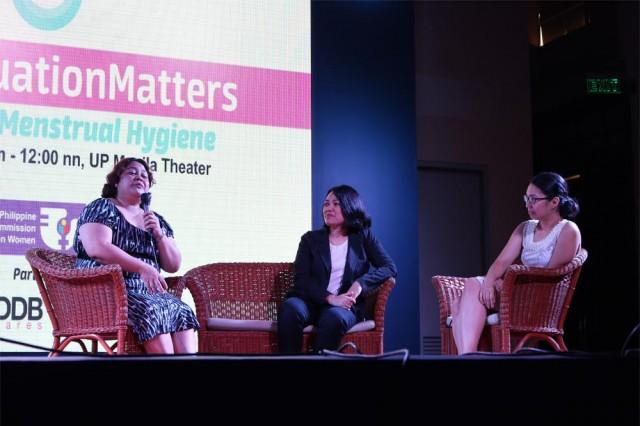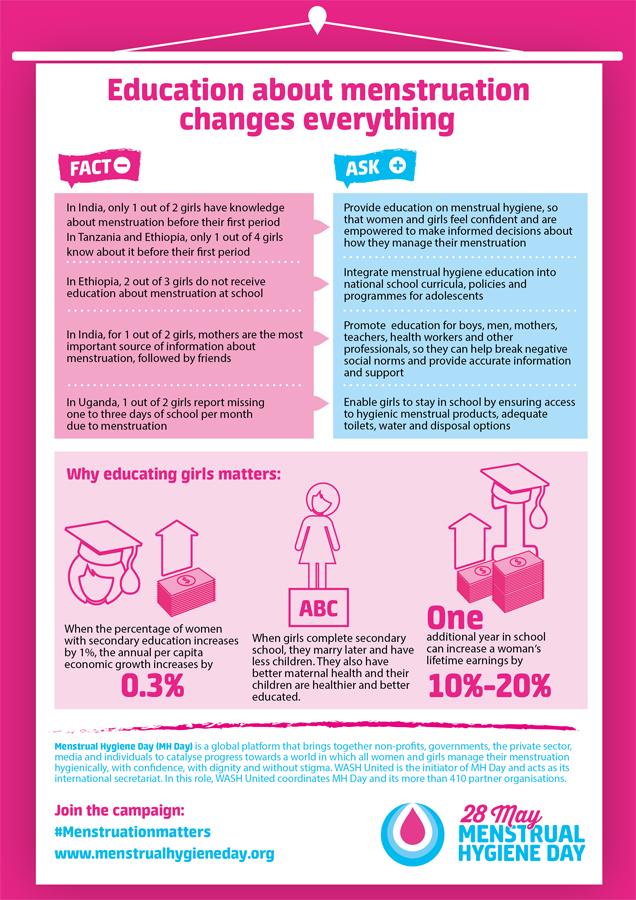Will I get eaten by sharks? Questions about menstruation answered
Were you ever told to jump three times or jump from the third step of the stairs to shorten the duration of your menstrual cycle?
There's no truth to this belief, but it continues to be passed down to younger generations. While this myth is mostly harmless, others push young women towards misinformation and enforce stigma about something completely natural.
In some countries, girls are made to feel impure or dirty when they get their first period—and Dr. Ella Cecilia Naliponguit, Dr. Melissa Sena, and Dr. Natasha Esteban emphasized at a forum on menstrual health management that this misguided belief is particularly dangerous.

Seeing menstrual blood for the first time could be less confusing or terrifying if parents—their mother or their father—introduce the concept to their children (regardless of gender!) early on.
Dr. Esteban clarified that there is no "right time" or "right age" for period talk, saying, "You can start as early as [kapag] nagsasalita at naglalakad na ang bata."
"Take every opportunity you can to discuss menstruation and menstrual health management," she added and recommended making use of time together at the grocery to discuss menstrual cycles.
While at the aisle where sanitary pads and products are, a parent can explain what they're used for—while assuring the child that menstruation is natural and not a terrifying ordeal.
Of course, the fear or shame or stigma associated with menstruation is most effectively fought with correct information about it. Dr. Esteban helpfully busted a few myths about it at the forum.
For example, did you know that you can swim during your period? Without worrying about sharks?
The shark myth drew laughs from the audience, but a stranger myth was on the list. Some people actually believe that stepping on animal manure will make menstrual blood smell more.
It'll certainly make whatever footwear you have on smell, Dr. Esteban said, but it definitely will not affect your period.
Parents should also make sure that they are handing down the correct information to their child about menstrual health management. A well-meaning mother or father might be tempted to buy feminine wash for their daughter, but the doctors at the forum explained that the vagina has a way of regulating itself and water is usually enough to keep it clean.
"We do not actually recommend the use of soap. Your vagina has its natural way of 'cleaning itself', so hindi na kailangan talaga ng soap or special soap, kasi mas lalong natatanggal 'yong protective barrier ng vagina," Dr. Esteban explained.
There are soaps that have been tested and proven safe for use, but she said, "Ideally we can use just regular water lang, no soap needed."
For anything strange, don't hesitate to contact your OB-GYNE if you can—although the reality is that most women do not have access even to the most basic things, like water and nutrient-rich food.
The Department of Education through the programs Comprehensive Water, Sanitation Health, and Hygiene Standards in Schools (WINS) and Weekly Iron with Folic Acid (WIFA) for teens in public high schools seek to provide help for adolescents.
Dr. Ella Cecilia Naliponguit of the Department of Education explained that nutrition is an important part of menstrual health management, which is why they are working to provide iron supplements to teenage girls to help prevent anemia.
The DepEd is additionally looking into restricting the sale and marketing of products high in sugar, salt, and fat to set a better standard for food in schools and increase the availability and accessibility of health options.
However, much work needs to be done. The DepEd through WINS has set a minimum requirement for washrooms and toilets in school, but she said, “Ang problema, how do the schools implement the policy?”
The student-to-bowl in elementary (34:1) and secondary schools (49:1) are adequate, there are areas which need more help. In certain schools in ARMM, the student-to-bowl ratio is 104:1.
Lack of access to a place to change their pads or tampons force young girls to feel inconvenienced and even ashamed of a normal biological function.
World Menstrual Hygiene Day is observed on May 28 to help combat the stigma on menstruation and help promote the need for better sanitation facilities in schools.

The taboo on menstruation feels ridiculous when we think about myths about sharks and men developing labia glue (to hold period blood in!), but for young girls in less developed areas in the world, outdated beliefs are used to justify oppression and even violence.
Teasing seems harmless at first, but that's where education should start—to put a stop to the use of women and women's bodies as the punchline to a joke. — BM, GMA News




